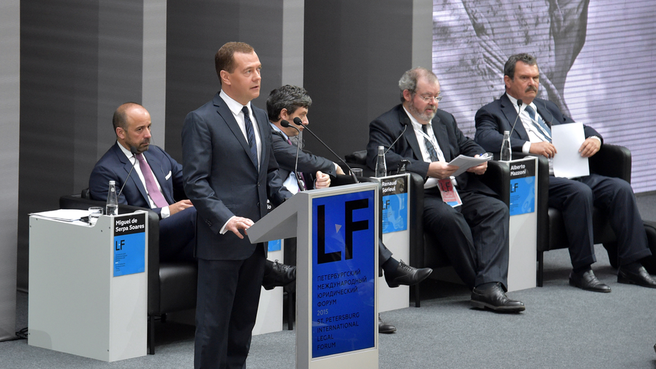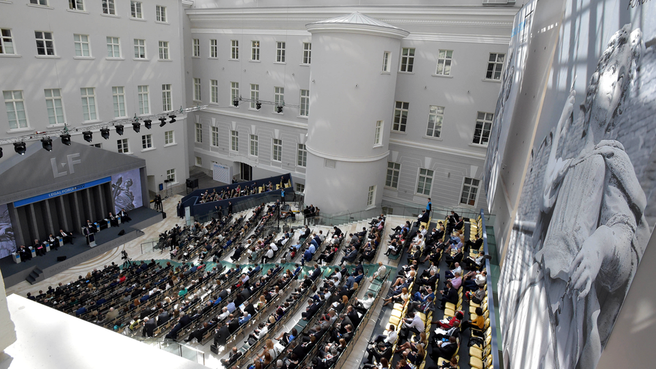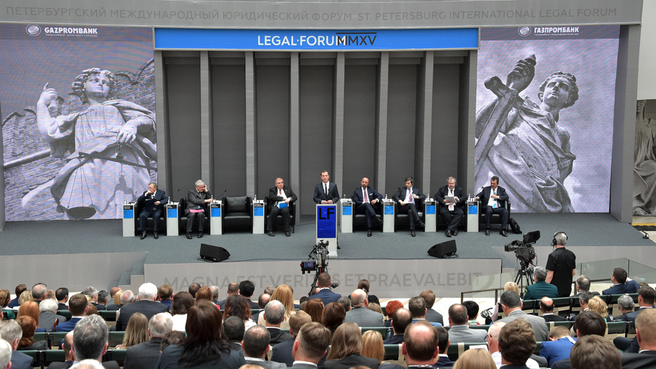Dmitry Medvedev: "In the past five years, the forum has become a popular and important international venue. This is evidenced by the number of participants, which grows with each year. In 2011, we had representatives from 35 countries here in St Petersburg. This year, we have over 3,000 guests from 84 countries."
The St Petersburg International Legal Forum was formed in 2011 by the Ministry of Justice and is sponsored by the President as a major platform for dialogue between politicians, lawyers, economists and researchers from all major economic and legal systems.
The plenary session’s theme this year is Mission of Law in an Era of Change.
Excerpts from Dmitry Medvedev’s remarks:
In the past five years, the forum has become a popular and important international venue. This is evidenced by the number of participants, which grows with each year. However, it is more than just numbers. It is also the geography of participation. In 2011, we had representatives from 35 countries here in St Petersburg. This year, we have over 3,000 guests from 84 countries.
A topic of today's plenary session is the mission of law in an era of change.
A period of change is always a fight, not just for change in social relations but also for the law per se. We cannot measure our success by the number of regulations and international agreements adopted and signed by our state authorities alone. It is more important to understand how strong the legal framework is and how adequate it is at this stage as it represents the basis of our states’ and our societies’ existence.
For the Government, the law is primarily a central instrument for addressing current social and economic problems. It is also a system of criteria that forms the basis for developing strategic areas of our activity. In other words, it is a compass that can be used to find solutions to issues of any level of complexity from approaches to international cooperation to forms and rules of public procurement.
To support the legal system in operation, we must form innovative legal constructs and take the necessary decisions, including experimental ones. We take such decisions and adopt such laws in our country indeed. One focuses on developing the Far East and provides a mechanism for establishing priority areas. It became clear that such mechanisms could be applied to other parts of our great country at that time. The second creates a special legal construct for creating a free economic zone in Crimea.
In addition to these unconventional moves, Russian law continues to be updated using traditional methods. The large-scale modernisation of civil law is nearing completion. The Civil Code includes institutions that have shown their effectiveness internationally and were tested by business practices. For example, in corporate law, we now have new institutions of public and non-public companies, as well as a general institute of corporate contract that allows parties to regulate their relationship in the most effective way.
As of 1 June, critical changes in the section regarding liabilities will come into force. For the first time, the code will include option-contract regulations, a security deposit and the subordination of creditors' claims upon the parties’ agreement, as well as many other regulations that can improve the attractiveness of Russian jurisdiction for entrepreneurs.
The adjustment of civil law lays down new, more accurate legal constructs that should serve as the basis for economic growth in our country and offer guarantees to foreign investors regarding the adequate protection of their rights and legitimate interests, which is not inferior to that which they might have in other – perhaps more understandable to them – legal systems.
In fact, our country has become a state that borrows various sets of legal institutions, including common-law institutions.
When experimenting with law and creating or borrowing new legal constructs, it is important to remember that – although the law is a flexible instrument – it still should not collapse under the weight of new factors. The basic principles and principles of law should clearly distinguish between the variables under review, perhaps even as temporary and permanent regulations that underlie our system of law.
To give you a relevant example, take a look at the public procurement system in our country, which is important in light of the volume of such procurement. We faced quite a difficult task of establishing a single, clearly structured open system to launch an effective mechanism to fight corruption in this area, and make Russian businessmen confident that they operate based on steady market rules.
Certain achievements have been reached in this area – a new contract system law is now active and an expanded auction toolkit is available. This is the second year that this law is in force and new rules are tested for effectiveness. To include practical law enforcement achievements, we had to update the law and include several packages of amendments. It will be further adjusted. Anyway, the general terms and conditions underlying this system must be preserved. This includes promoting competition, auction transparency, openness and customer professionalism.
The challenges posed to the legal world by the Internet are another important area of focus. Effective legal strategy in this area is impossible without full-scale international cooperation. We appreciate the opportunities provided by the Internet, but at the same time the Government of any country, including ours, must focus on stability and online security, especially as offences in this area are usually transboundary. Therefore, we have to focus on establishing a high-quality regulatory framework for the Internet.
There are different schools of thought regarding the limitations of freedom for the Internet. Proposals exist regarding the development of a convention on personal data protection at the level of the UN, which would reflect best-practices in the world today. So far, to put it bluntly, politicians are reluctant to discuss these issues on an international level. Several years ago, I invited my colleagues at various summits to address this issue in earnest on an international level, but so far there does not seem to be any progress there. Nevertheless, personal data protection and Internet regulation methods should be generally reasonable and sufficient.
Judicial decisions are an important guarantee of the development of law. So far, there is no universal treaty in international law that would demarcate the jurisdiction of courts in different states. After all, corresponding rules rarely coincide. This creates a great deal of difficulties.
Furthermore, states are now seeking to expand the jurisdiction of their courts (some states are doing this with excessive zeal), and sooner or later, each legislative system should make it clear how the decisions of foreign courts will be implemented in its territory. This is a challenging question for lawyers. It is practically impossible to avoid so-called interference in sovereignty in the context of a multinational economy, the Internet, and global trends in the world, even though each country decides for itself how wide it will open the doors to decisions made by other states.
In Russia, these decisions depend on whether there is an international treaty with the country whose court has made a corresponding decision.
We have quite a few such treaties. They cover a wide range of civil cases. Court-approved amicable agreements and verdicts in criminal cases involving damages are also recognised. Decisions by foreign courts of arbitration are also subject to implementation, and there are specific problems and opportunities there. However, experts increasingly say that, under current circumstances, the Code of Civil Procedure in our country should be expanded and corresponding decisions developed. And, of course, there is a serious danger for international law, specifically, the politicisation of judicial decisions.
The current system of rules of international law works only through national law. However, obviously, such mechanisms cannot be used to camouflage political aims. Our shared long-term interests are served by a code of binding progressive and democratic norms. So, it is crucial to preserve the existing legal tools for the amicable resolution of disputes and to develop decision-making mechanisms and mechanisms for the implementation of coordinated decisions on an international level.
As is known, such mechanisms are provided in the framework of the UN, World Trade Organisation, Council of Europe and other international associations, and now also the Eurasian Economic Union.
The treaty on the union’s establishment was signed by Russia, Belarus and Kazakhstan a year ago, after two years of talks. This is a new stage in Eurasian integration. The norms that the Eurasian Union follows today take into account international rules, including the principles of the World Trade Organisation. Legal support for Russia’s economic policy will continue to involve the implementation of a number of World Trade Organisation and Eurasian Economic Union principles on a national level. Among other things, in conjunction with our partners, we will harmonise economic legislation, taking into account Eurasian Economic Union requirements.
Like other union members, Russia is absolutely open to cooperation. The status of a full World Trade Organisation member is beneficial to us. This is important for the country’s economic development and the promotion of our goods on international markets. No country today can achieve its goals on the domestic market single-handedly, so the international community is simply doomed to integration in this regard.
The Eurasian Economic Union has now been joined by another two countries – Kyrgyzstan and Armenia. A new free trade agreement between member states and Vietnam has been drafted. It will be the first agreement of this kind to be signed by the Eurasian Economic Union. We will sign it the day after tomorrow at a heads of government meeting in Kazakhstan.
We also plan to develop cooperation with other countries, including China, harmonising Eurasian economic integration and the Silk Road Economic Belt initiative. This is a positive experience. It leads us to review our ties with EU countries, the United States and some other states.
The past year has enriched the practice of international law with living amid the so-called sanctions. Talking chronologically, let me remind you that last March a referendum was held in Crimea, where the majority of people voted for its reunification with Russia. Our country recognised its results, while a number of other countries, including the United States and EU states, introduced sanctions against Russia. However, those were unilateral sanctions, not a collective impact, if we speak in legal terms, as the Security Council did not introduce any sanctions. I am not even saying that when those sanctions were imposed, the opinion of those who advocated for integration with Russia was ignored. Subsequently, the escalation of the situation in southeastern Ukraine led to an expansion in so-called unilateral sanctions, which were now aimed against specific sectors of our economy, as well as individuals and companies.
For our part, we retaliated by restricting the import of agricultural products, raw materials, foodstuffs, and certain categories of goods. All parties that became involved in this conflict are World Trade Organisation member states. Furthermore, it so happened that World Trade Organisation rules were invoked to substantiate the regime of unilateral sanctions. At first, our colleagues and partners cited the well-known limitations in the organisation’s rules. Later, naturally, using the exceptions provided for under current World Trade Organisation rules, Russia decided to protect its food market. Such is the sequence of events.
I do not think that this is a beneficial development for international trade relations. In the very near future, we will have to decide on whether to extend these retaliatory measures. Naturally, our actions – and I can say this bluntly – will be commensurate and based on the actions of our partners from other countries.
Nevertheless, despite the events of the past year, I believe that there is no question about a crisis in international law. Rather, it is a crisis in the relations between countries, a crisis in states’ approach toward international law.
It is obvious to me that we should return to a unified understanding of the rules of international law, primarily the provisions of the UN Charter and international conventions, which ensure the protection of human rights across the whole range of current problems in the world, and based on this, restore trust in generally recognised principles of law on an international level. A great deal here depends on our professional solidarity, as the legal community understands better than anyone that there is just no alternative to the universal tools of law. And we definitely have such an array of tools.














